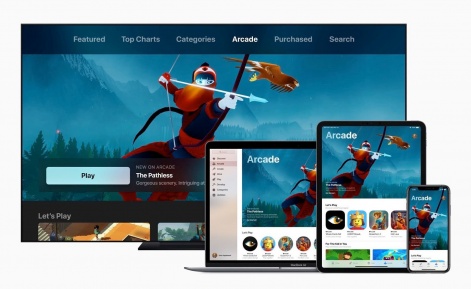After years of - at best - ignoring games as a strategic element to its business, 2019 has seen Apple make a giant statement about the way it thinks mobile gaming should be.
No ads, no IAPs, $5 a month, the Apple Arcade subscription service can also be shared between six family members.
But will it work?
We’ve already asked our Monetizer Mavens for their first opinion about Apple Arcade - broadly they don’t think it will be a great success - so as the launch approaches, we instead asked them:
- Will you be signing up to Apple Arcade? Why?
- What can Apple to further to make this a success?

Ben is a 15-year veteran of the games industry - he's worked as a senior executive, studio head, project lead, creative director and game designer at companies like DeNA, EA, Sony and Lionhead.
He started working on traditional games, but has been focussed on the free-to-play business model since 2006 - an extremely long time by western standards. During that time He's worked on a total of ten separate free-to-play games across five different platforms reaching over 50 million users.
Speaking purely from a consumer point of view, I struggle to find games on the App Store that appeal to me, and my daughter often hassles me to buy a certain game or to pay for soft currency in one.
I can definitely see the appeal of such a low subscription cost meaning we, to an extent, solve both of those issues.
I don’t need to hunt around for reviews or recommendations of good premium games, and I can make a monthly payment rather than several smaller ones.
Given the subscription is family wide, I think this must be the main target market for the service.
In terms of how Apple makes this a success, it’s all about building a vast portfolio of games that appeal to the widest possible audience, otherwise even that low fee won’t feel good enough value.
I echo Ben’s position. I’m not really interested in it for me: I know a lot about games, I actively like F2P games, and the genre I like (which tends towards collection/strategy) works well with F2P.
The danger with subscriptions is that it isn’t the low price that is the key, it’s the very existence of a subscription at all which becomes the motivation to cancel.
But for my kids, I find it frustrating to have to invest time in helping them discover games that they might like when it feels as if the risks – of overly-aggressive F2P, of inappropriate ads, of being a rubbish game – can easily outweigh the amount of fun that they get and the time I have to invest.
A single subscription could solve that. Which would be awesome. It will also help for the kind of games that really struggle with F2P, particularly narrative-driven games, or game with a clear beginning, middle and end.
On the other hand, I already have a lot of subscriptions. Netflix. Spotify. The Week (a physical magazine, no less!) and so on. Sony used to say that the average consumer is only prepared to have about 7 subscriptions, because that’s how many things they can remember in their working memory.
Utilities don’t count, and internet/mobile are now considered utilities, so that’s good. But a subscription often works on a one in/one out basis.
So the subscription needs to compete with all the other subscriptions in someone’s life: the gym; Netflix, Xbox Live, World of Warcraft etc. Apple needs to make sure that the range and novelty of the games is sufficient to keep it in the must-keep list.
The danger with subscriptions is that it isn’t the low price that is the key, it’s the very existence of a subscription at all which becomes the motivation to cancel.

With over 15 years’ data mining experience, Mark co-founded deltaDNA, formerly GamesAnalytics, to unlock big data to drive player understanding, introducing the concept of Player Relationship Management to build better games.
The angle Apple are pushing with Apple Arcade is towards the mid-core casual to core gaming audience with the promise of no micro transactions/ads, exclusive games and curated gaming content.
There is still this stigma surrounding F2P amongst the core audience and premium single-player/narrative driven games are simply not gaining enough traction anymore in comparison to the F2P competition on the app store.
The exclusive content will need to be consistently appealing to sustain long-term subscription retention.
Apple Arcade is trying to keep the traditional game experience alive on mobile without the need for microtransactions or ads, it may not appeal to the masses but it will certainly please some of those that like a certain gaming experience on mobile.
As it stands now, the decision to spend on a single premium title is a tough one since the app store can feel overwhelming at times when trying to pick out a new game. F2P just doesn't have that risk factor as the player can simply delete a game and move on if they don't like it.
Arcade helps bypass the risk and the hunt that is tied to buying premium titles on mobile by letting players buy into a suite of carefully selected games without the need to purchase anything on an individual basis.
The risk with Apple Arcade is that the audience this is intended for can already get a "premium" experience on console so the subscription adoption may well be tough. The exclusive content will need to be consistently appealing to sustain long-term subscription retention.
Where Arcade could be more commercially viable, and I've heard this mentioned before, is if it was aimed at a younger audience. If parents could buy into a monthly subscription knowing that they didn't need to worry about racking up large bills on IAPs and that the content delivered is curated carefully by apple, it would be somewhat of a unique selling point.

However a child’s interest can change wildly in a short period of time. If Apple can capture the attention of all of the popular children’s networks such as Nickelodeon, Cartoon Network, BBC and the likes it may generate traction.
In addition, when it comes to the adoption of premium games on the general app store, children games see most of the success as parents give in to the relentless demands of their children to buy the latest Hey Duggee or Peppa Pig app.
I would be interested in Arcade, and very likely signing up, except for one key problem: I have an Android phone.
Were there a cross-platform version of this, I would likely be signing up immediately. That being said, I'm a huge fan of what Apple is doing here. It's a boon for single-player, story driven games that are not great candidates for the F2P model.
Giving devs a new way to build a successful studio on the back of premium indie games is something that I'm incredibly happy to see.
As much as I enjoy F2P games, there are limits to the types of games that are both enjoyable experiences for the player and successful business models for the studios.
Apple Arcade gives players the opportunity to explore a curated library in a no-commitment fashion. As others have said, getting over the $/£/€ 5 purchase of a quality premium game now seems like a big purchase compared to the ease of installing and trying out a F2P game.
Take Netflix, Spotify, etc. for example - they took what was previously a premium-only experience (buying/renting movies, music) and turned it into a subscription model. Arcade will have similar challenges: keeping the library fresh and relevant to as many subscribers as possible.
A big part of that value add is the curation - streaming media services either manually choose what to supply (e.g. Netflix choosing which shows to buy / fund) or doing so algorithmically (e.g. Spotify's Discover Weekly playlists, Netflix's recommendation engine). Apple's curation is manual, which seems to me both the correct way to do it for this service. It's a value-add for the consumer if Apple can successfully identify interesting, novel games.
Creating a way for developers who aren't interested in the F2P model and giving them a new way to build a successful studio on the back of premium indie games is something that I'm incredibly happy to see.
























